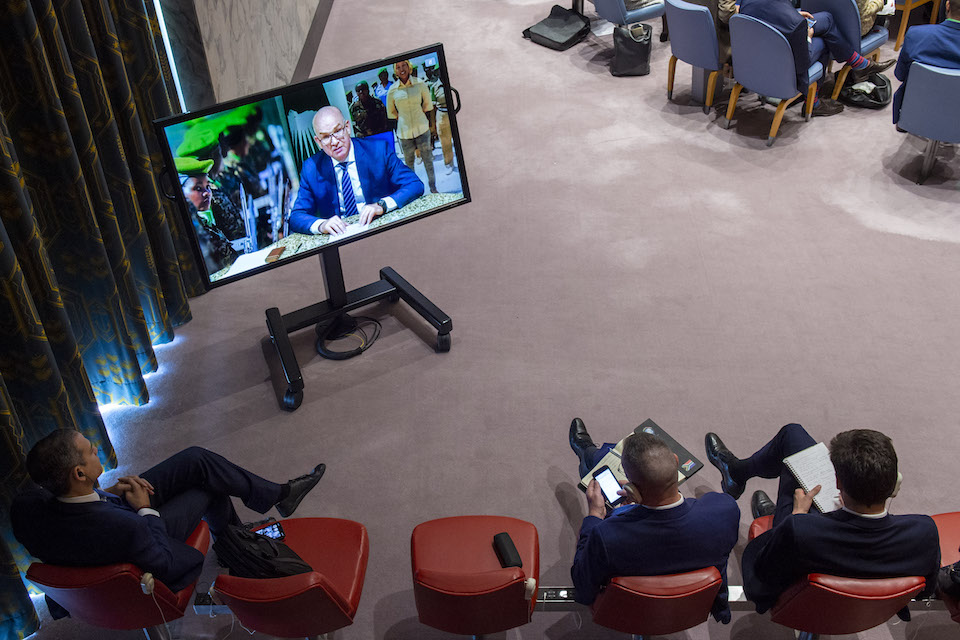Ending bloodshed in Libya
Statement by Ambassador Karen Pierce, UK Permanent Representative to the UN, at the Security Council Briefing on Libya

Thank you very much Mr President. Thank you to Mr Salamé and Mr Chergui for your briefings and to the German ambassador for his report of the Sanctions Committee. We’re very grateful that the SRSG could be here in New York. That was very sobering and quite an alarming briefing and we take very seriously, Mr President, the warnings that you have given.
I wanted to set out three clear things right at the start, if I may, so that there can be no ambiguity.
First of all, in response to Mr Salamé’s appeal to the parties on the ground and his request for a very firm message from the Council, I wanted to do the following, Mr President:
I wanted to express the United Kingdom’s very firm support for Mr Salamé and the UN-led process as the only way ultimately to achieve the security and stability that all Libyans deserve.
Secondly, we are extremely clear in our call which I repeat today for all those involved in the conflict to commit to an immediate ceasefire, unfettered humanitarian access and a resumption of political talks facilitated by Mr Salamé.
I would like to really stress those points and I invite, Mr President, all Council members to do likewise so there’s no doubt about the strength of feeling on the Council on these issues and the importance of unity in the Council.
We’re very concerned, as the briefings - including from the African Union – implied, that the security and humanitarian situation continues to deteriorate. As I say, this is alarming. There can be no military solution and there certainly won’t be anything like a clean victory for any party in Libya. The protracted and worsening violence as the SRSG said, it certainly doesn’t benefit ordinary people in Libya. And we really need to put them front and centre of what we’re doing.
Mr President, I’d like to turn to the arms embargo. All Member States have an obligation under SCR 1970. We know or we heard earlier that ships even now may be on their way to Libyan ports with arms. Flooding Libya with arms is only going to fuel escalation and it’s only going to prolong the conflict and it’s only going to retard progress towards a ceasefire. So we really do call on all Member States to implement that arms embargo in full and we hope Libya Sanctions Committee will continue to do its good work at looking at transgressions of that arms embargo.
And I think we also need to remember, Mr President that Daesh and other extremist groups are capitalising on the chaos in Libya to carry out opportunistic attacks. That ought to worry all of us. It particularly worries those of us who are at direct risk from Daesh-inspired terrorism. Continued fighting will continue to have a negative impact on the counter-terrorism agenda in Libya. And we need to keep in mind that the people who benefit most from this conflict are actually these extremist groups. And that’s another sobering point that we all ought to reflect on.
I wanted, if I may, to say a few words about humanitarian and oil. There have been reports of targeting of civilians. I want to urgently call on all parties to respect their obligations under international humanitarian law and to ensure that civilians, civilian infrastructure and medical personnel facilities and transports are protected. I want to underscore the obligations in Resolution 2286 about not targeting health workers and detention centres. I want to stress the need for the greatest possible humanitarian access on the ground.
The Special Representative mentioned the oil situation. Mr President, we believe it’s essential that all Libya’s exports – oil exports – remain under the supervision of the National Oil Corporation of Tripoli in accordance with this Council’s resolutions and any attempt by the parties to the conflict to divert Libya’s oil resources for their own ends again needs to be addressed by the Libya Sanctions Committee.
We heard a little bit about Mr Kartas from the German representative. We have supported the UN in this; we continue to support the UN. We have heard reports of his safe release, but I would like to underscore, Mr President that UN personnel carry immunity. They work for the United Nations. The United Nations works for the benefit of all citizens in those countries where it is situated and we really do call on Member States to respect that.
So if I may conclude, the safety of UN personnel in general is of great concern to us. A cease fire and a return to the UN-led political process. The only way to end the bloodshed in Libya and the only way to chart a way forward before the situation collapses into an even more deadly and chaotic conflict.
As penholder Mr President, we will continue to engage Council members on a way forward and the appropriate steps that this Council can take in support of the SRSG.
Thank you very much.